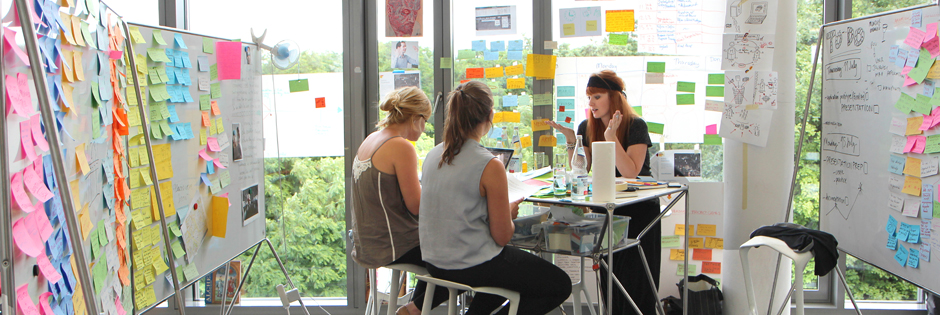Global Design Thinking Workshops (GDTW) are a concept that goes beyond the mere introduction to Design Thinking as a process. We have developed this format to dive deep into Design Thinking and create future scenarios that bridge the gap between the "what is" and the "what if". We offer this course for HPI students and external participants.
Together with around 50 participants from over 15 countries, you will work on complex and global innovation problems. You will learn how to apply design thinking methods and reflect on the development in an international and diverse team.
This offer is aimed in particular at international students who would like to spend a week during their semester break at the HPI d-school in Potsdam working on a future-oriented topic in a team.
In our GDTW program, we offer three different workshops, each with a focus topic:
- 01 Strategic Design: From Human-Centered Design to the Strategic Future
- 02 Designing for global impact
- 03 Teamed Leadership
What makes the GDTW program global?
The Content: We will be using a problem-based learning approach and tap into a real-world problem with a systems perspective. And we will work together with an international project partner.
Program team: We design our GDTW program with our international network of Design Thinking Coaches and cooperate regularly with partner institutions from our global network, which also gave rise to the GDTA (Global Design Thinking Alliance). Participants have the opportunity to benefit from the experience and exchange with colleagues from other design thinking institutions in the USA, South Africa, Sweden, Malaysia, Mexico and Egypt.
The participants & coaches: In this program, participants form diverse, multidisciplinary, and multicultural teams that work together with team coaches and a project partner on a real-life problem. This is a unique opportunity to learn from and with students with different backgrounds and ways of thinking, from other cities and countries, accompanied by one of our highly experienced Design Thinking coaches.
Format: This is an on-site course – with a digital mindset. We will welcome you on our beautiful campus in Potsdam, Germany where you will work on-site. We will incorporate digital platforms and tools to support your on-site work. During this workshop you will work hand in hand with an international team (max. 5 people including yourself) and a coach who will accompany you.Thurs
The time required for active participation in this course is approximately 50 hours. There are times that are obligatory for everyone and there are times for flexible teamwork. In the following overview you will find the basic structure.
Our program includes the fixed times for working together in the program (43 hours):
- Thursday 27.02.2025: 9.00 – 12.00 pm CET (3 hours) ONLINE
- Thursday 06.03.2025: 09:00 – 17:00 CET (8 hours) ON-SITE
- Friday 07.03.2025: 09:00 – 17:00 CET (8 hours) ON-SITE
- Monday 10.03.2025: 09:00 – 17:00 CET (8 hours) ON-SITE
- Tuesday 11.03.2025: 09:00 – 17:00 CET (8 hours) ON-SITE
- Wednesday 12.03.2025: 09:00 – 17:00 CET (8 hours) ON-SITE
We also expect flexible individual and team work after program days. This will include in total up to 7 hours for your project documentation.
As our programs run on a team-based, experiential approach, your attendance on-site on all program days is mandatory, please consider this carefully before applying.
Application for the Global Design Thinking Workshop
The Global Design Thinking Workshop is open for students and graduates of all disciplines and universities and young professionals. You can apply for this course if you are enrolled student (at any academic institution) OR if you have finished your last academic program less than two years ago.
You can sign up for our application reminder and we will inform you via e-mail once the application period for the next Global Design Thinking Workshop starts.
Participation fee is 200 €. Participation is free of charge for HPI students and students of the University of Potsdam.

